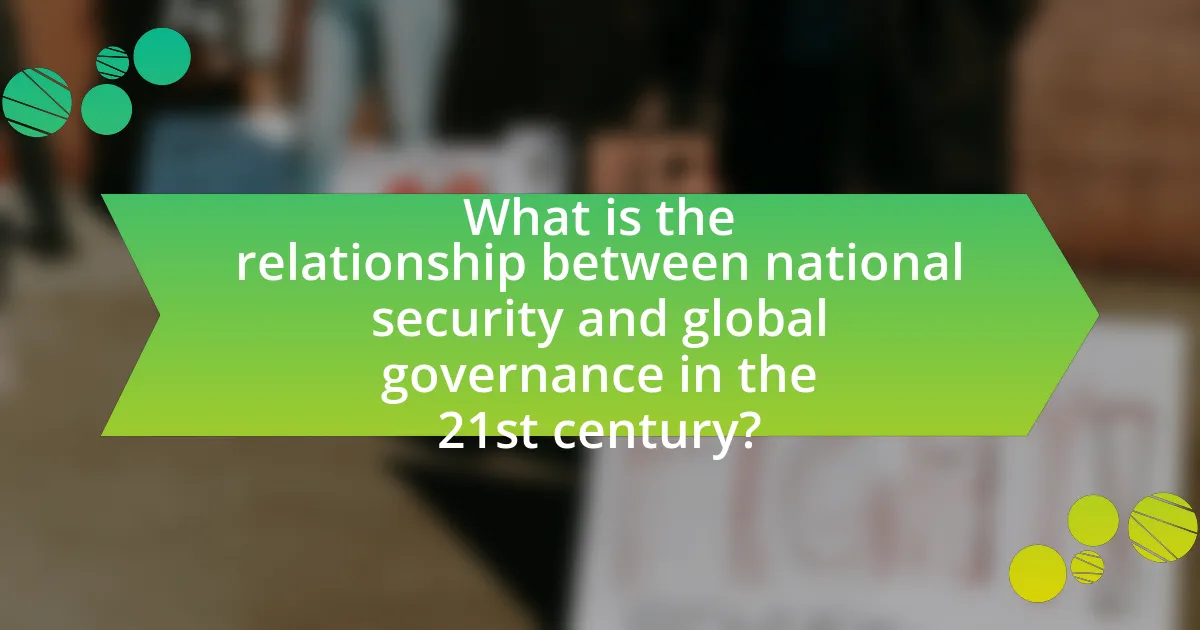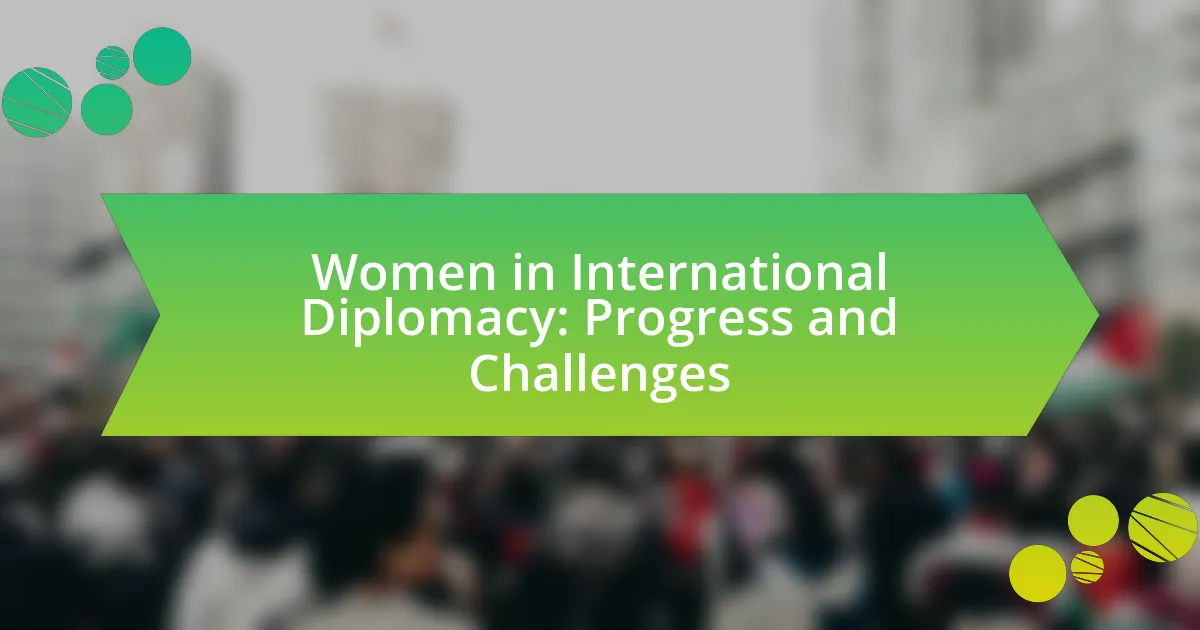The article examines the interdependent relationship between national security and global governance in the 21st century, highlighting how national security increasingly relies on international cooperation to tackle transnational threats such as terrorism, climate change, and pandemics. It discusses the evolution of national security concepts, key influencing factors, and the role of international organizations in shaping security policies. The article also addresses challenges in aligning national interests with global governance efforts, the impact of emerging technologies, and strategies for enhancing collaboration among states. Additionally, it explores future trends, particularly the significance of multilateralism and climate change in shaping security frameworks.

What is the relationship between national security and global governance in the 21st century?
National security and global governance in the 21st century are interdependent, as national security increasingly relies on international cooperation to address transnational threats. The rise of global challenges such as terrorism, climate change, and pandemics necessitates collaborative frameworks, exemplified by organizations like the United Nations and NATO, which facilitate collective security measures. For instance, the 2015 Paris Agreement on climate change illustrates how global governance structures are essential for national security, as environmental degradation poses risks to stability and safety. Thus, effective global governance enhances national security by fostering multilateral responses to shared threats.
How has the concept of national security evolved in the context of global governance?
The concept of national security has evolved from a focus on military threats to encompass a broader range of issues, including economic stability, environmental challenges, and cybersecurity, within the framework of global governance. This shift reflects the recognition that security is interconnected with global systems and requires international cooperation to address transnational threats. For instance, the rise of terrorism and cyber warfare has prompted nations to collaborate through organizations like the United Nations and NATO, emphasizing collective security measures. Additionally, the 2016 Global Security Index highlighted that 70% of security experts believe climate change poses a significant threat to national security, illustrating the need for a comprehensive approach that integrates environmental policies into national security strategies.
What are the key factors influencing national security today?
The key factors influencing national security today include geopolitical tensions, cyber threats, terrorism, economic stability, and climate change. Geopolitical tensions, such as those between major powers like the United States and China, create an environment of uncertainty and potential conflict, impacting national defense strategies. Cyber threats have escalated, with state and non-state actors targeting critical infrastructure, as evidenced by incidents like the 2020 SolarWinds hack, which compromised numerous government agencies. Terrorism remains a persistent threat, with groups adapting to new technologies and tactics, as seen in the rise of domestic extremism in various countries. Economic stability is crucial, as economic downturns can lead to social unrest and weaken national resilience. Lastly, climate change poses a long-term threat to national security by exacerbating resource scarcity and leading to displacement, which can fuel conflict, as highlighted in the 2021 U.S. National Security Strategy.
How do international organizations shape national security policies?
International organizations shape national security policies by establishing norms, facilitating cooperation, and providing platforms for dialogue among states. For instance, the United Nations plays a crucial role in promoting collective security through resolutions that encourage member states to collaborate on issues like terrorism and arms control. Additionally, organizations such as NATO influence national defense strategies by setting collective defense commitments, which member countries integrate into their own security frameworks. The World Trade Organization also impacts national security indirectly by promoting economic stability, which is essential for a secure environment. These organizations create a structured approach to security that aligns national policies with international standards and collective interests.
Why is global governance crucial for national security?
Global governance is crucial for national security because it facilitates international cooperation to address transnational threats such as terrorism, cybercrime, and pandemics. These threats often exceed the capacity of individual nations to manage effectively, necessitating collaborative frameworks and agreements. For instance, the United Nations Security Council plays a pivotal role in coordinating responses to security challenges, as seen in its resolutions aimed at combating terrorism and promoting peacekeeping efforts. Additionally, global governance structures, like the World Health Organization, are essential for managing health crises that can destabilize nations, as demonstrated during the COVID-19 pandemic, which highlighted the interconnectedness of global health and security.
What roles do international treaties and agreements play in enhancing security?
International treaties and agreements play a crucial role in enhancing security by establishing legal frameworks that promote cooperation among nations. These frameworks facilitate the resolution of conflicts, reduce the likelihood of war, and foster trust through transparency and accountability. For instance, the Treaty on the Non-Proliferation of Nuclear Weapons (NPT) aims to prevent the spread of nuclear weapons and promote disarmament, contributing to global stability. Additionally, agreements like the Paris Agreement on climate change address security threats posed by environmental issues, highlighting the interconnectedness of global challenges. Such treaties and agreements create mechanisms for dialogue and negotiation, which are essential for maintaining peace and security in an increasingly complex international landscape.
How does global governance address transnational threats?
Global governance addresses transnational threats through collaborative frameworks that enhance international cooperation and coordination among states and organizations. These frameworks include treaties, conventions, and multilateral agreements that facilitate information sharing, resource allocation, and joint action against issues such as terrorism, climate change, and pandemics. For instance, the Paris Agreement on climate change exemplifies how countries collectively commit to reducing greenhouse gas emissions, thereby addressing a global threat that transcends national borders. Additionally, organizations like the United Nations and Interpol play crucial roles in fostering dialogue and implementing strategies to combat transnational crime and security challenges, demonstrating the effectiveness of global governance in mitigating risks that affect multiple nations.
What challenges exist in the relationship between national security and global governance?
The relationship between national security and global governance faces several challenges, primarily due to conflicting priorities and differing approaches among nations. National security often emphasizes state sovereignty and the protection of borders, which can lead to unilateral actions that undermine collective global governance efforts. For instance, countries may prioritize military spending over international cooperation, as seen in the increased defense budgets of nations like the United States and China, which can detract from funding for global initiatives such as climate change or public health. Additionally, the rise of non-state actors and transnational threats, such as terrorism and cyber warfare, complicates traditional security paradigms, making it difficult for global governance frameworks to effectively address these issues. The lack of consensus on global norms and standards further exacerbates these challenges, as nations may have divergent views on what constitutes a security threat, hindering collaborative responses.
How do differing national interests impact global governance efforts?
Differing national interests significantly hinder global governance efforts by creating conflicts in priorities and objectives among countries. For instance, during climate negotiations, developed nations often prioritize economic growth and energy security, while developing nations focus on poverty alleviation and sustainable development. This divergence was evident in the 2015 Paris Agreement, where countries struggled to agree on binding commitments due to their varying economic capabilities and environmental responsibilities. Such disparities lead to fragmented policies and ineffective collaboration, ultimately undermining the effectiveness of global governance initiatives.
What are the implications of unilateral actions by states on global security?
Unilateral actions by states can significantly destabilize global security by undermining international norms and fostering conflict. When a state acts independently, it often disregards multilateral agreements, which can lead to escalated tensions among nations. For instance, the United States’ withdrawal from the Paris Agreement in 2017 prompted concerns about climate change cooperation, illustrating how unilateral decisions can hinder collective efforts to address global challenges. Additionally, such actions can provoke retaliatory measures from other states, as seen in the trade wars initiated by various countries, which can escalate into broader geopolitical conflicts. The implications of these actions are profound, as they can erode trust among nations and diminish the effectiveness of global governance structures designed to maintain peace and security.
How do emerging technologies affect national security and global governance?
Emerging technologies significantly impact national security and global governance by enhancing capabilities for surveillance, cyber defense, and military operations. For instance, advancements in artificial intelligence and machine learning enable nations to process vast amounts of data for intelligence gathering, improving threat detection and response times. Additionally, the proliferation of cyber capabilities has led to increased vulnerabilities, as seen in incidents like the 2016 U.S. presidential election interference, which highlighted the need for robust cybersecurity measures in governance. Furthermore, technologies such as drones and autonomous weapons systems are reshaping military strategies and international norms, prompting discussions on ethical implications and regulatory frameworks. These developments necessitate collaborative global governance efforts to address challenges like cybercrime and the arms race in emerging technologies, as evidenced by initiatives like the Global Partnership on Artificial Intelligence, which aims to promote responsible AI use among nations.
What are the risks associated with cyber security in the context of global governance?
The risks associated with cyber security in the context of global governance include data breaches, cyber espionage, and the disruption of critical infrastructure. Data breaches can lead to the unauthorized access and theft of sensitive information, undermining trust in governmental institutions and international relations. Cyber espionage poses a threat to national security as state and non-state actors seek to gain intelligence on other nations, potentially destabilizing geopolitical dynamics. Additionally, the disruption of critical infrastructure, such as power grids and communication networks, can have widespread consequences, affecting not only national security but also global economic stability. According to a report by the World Economic Forum, cyber attacks are among the top global risks, highlighting the urgent need for collaborative governance frameworks to address these challenges effectively.
How can technology be leveraged to improve global security frameworks?
Technology can be leveraged to improve global security frameworks by enhancing data sharing, facilitating real-time communication, and employing advanced analytics for threat detection. For instance, the integration of artificial intelligence in cybersecurity can identify and mitigate threats more efficiently, as evidenced by a report from the World Economic Forum, which highlights that AI can reduce response times to cyber incidents by up to 90%. Additionally, blockchain technology can provide secure and transparent channels for information exchange among nations, thereby fostering trust and collaboration. The use of satellite technology for surveillance and reconnaissance also enables countries to monitor potential threats and respond proactively, as demonstrated by the increased use of satellite imagery in conflict zones. These technological advancements collectively strengthen the capacity of global security frameworks to address emerging threats effectively.
What strategies can enhance the synergy between national security and global governance?
Enhancing the synergy between national security and global governance can be achieved through collaborative frameworks that prioritize shared threats and mutual interests. Establishing international partnerships, such as intelligence-sharing agreements and joint military exercises, fosters trust and improves response capabilities to transnational challenges like terrorism and cyber threats. For instance, the NATO alliance exemplifies how collective defense mechanisms can strengthen both national security and global stability. Additionally, integrating security policies with development agendas, as seen in the United Nations’ Sustainable Development Goals, addresses root causes of conflict and promotes long-term peace. These strategies demonstrate that coordinated efforts can effectively align national security objectives with global governance initiatives, ultimately leading to a more secure and stable international environment.
How can states collaborate more effectively on security issues?
States can collaborate more effectively on security issues by establishing multilateral agreements and frameworks that facilitate information sharing and joint operations. For instance, organizations like NATO and the United Nations have successfully fostered cooperation among member states through collective defense agreements and peacekeeping missions. These frameworks enable states to pool resources, share intelligence, and coordinate responses to security threats, thereby enhancing overall security. Historical examples, such as the collaborative efforts during the Cold War, demonstrate that collective security arrangements can deter aggression and promote stability among nations.
What best practices can be adopted for integrating national security with global governance?
Best practices for integrating national security with global governance include fostering multilateral cooperation, enhancing information sharing, and aligning national policies with international norms. Multilateral cooperation, exemplified by organizations like the United Nations, facilitates collective security measures and addresses transnational threats effectively. Enhanced information sharing among nations, as seen in intelligence-sharing agreements, improves situational awareness and response capabilities. Aligning national policies with international norms, such as the Responsibility to Protect doctrine, ensures that states act in accordance with global standards, promoting stability and security. These practices are supported by historical examples, such as the collaborative efforts during the COVID-19 pandemic, which highlighted the necessity of global governance in addressing security challenges.
What are the future trends in the relationship between national security and global governance?
Future trends in the relationship between national security and global governance will increasingly emphasize collaborative frameworks to address transnational threats. As globalization intensifies, issues such as cyber threats, climate change, and pandemics will require nations to work together more closely, leading to enhanced multilateral agreements and shared security initiatives. For instance, the rise of cyber warfare has prompted countries to engage in joint cybersecurity efforts, exemplified by initiatives like the NATO Cyber Defence Pledge, which aims to strengthen collective defense against cyber threats. Additionally, the growing recognition of climate change as a national security issue is driving international cooperation, as seen in agreements like the Paris Accord, which seeks to mitigate environmental risks that can destabilize nations. These trends indicate a shift towards integrated security strategies that prioritize global governance mechanisms to effectively manage complex security challenges.
How might climate change impact national security and global governance frameworks?
Climate change significantly impacts national security and global governance frameworks by exacerbating resource scarcity, increasing the frequency of natural disasters, and driving migration. These factors can lead to heightened tensions between nations, as competition for dwindling resources such as water and arable land intensifies. For instance, the 2011 Syrian civil war has been partially attributed to severe drought conditions linked to climate change, which displaced rural populations and contributed to social unrest. Furthermore, global governance frameworks may struggle to address these challenges effectively, as existing institutions often lack the necessary authority and coordination to manage transnational climate-related issues. The United Nations Framework Convention on Climate Change (UNFCCC) exemplifies efforts to create a global response, yet its effectiveness is often hindered by differing national interests and priorities.
What role will multilateralism play in shaping future security policies?
Multilateralism will play a crucial role in shaping future security policies by fostering cooperation among nations to address transnational threats. As global challenges such as terrorism, cyber threats, and climate change transcend national borders, multilateral frameworks like the United Nations and NATO facilitate collective action and resource sharing. Historical examples, such as the Paris Agreement on climate change, demonstrate how multilateralism can unify countries towards common security goals, enhancing resilience and response capabilities. Furthermore, research indicates that multilateral cooperation leads to more effective conflict resolution and peacekeeping efforts, as seen in various UN missions that have successfully stabilized regions post-conflict.
What practical steps can nations take to strengthen their national security within the framework of global governance?
Nations can strengthen their national security within the framework of global governance by enhancing international cooperation, sharing intelligence, and participating in multilateral security agreements. For instance, countries can engage in joint military exercises and training programs to improve interoperability and readiness against common threats. Additionally, sharing intelligence through platforms like the Five Eyes alliance has proven effective in countering terrorism and cyber threats, as evidenced by the disruption of numerous plots through collaborative efforts. Furthermore, nations can contribute to global governance by actively participating in organizations such as the United Nations, which facilitates dialogue and conflict resolution, thereby reducing the likelihood of armed conflict and enhancing collective security.






